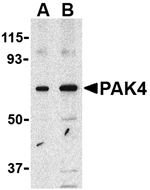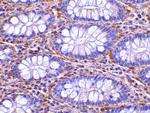The p21-activated kinases (PAKs) are serine-threonine kinases that bind to the active forms of Cdc42 and Rac. They are divided into two groups, the first of which include PAK1, 2 and 3, and can be activated by Cdc42/Rac binding. Group 1 PAKs contain an autoinhibitory domain whose activity is regulated by Cdc42/Rac binding. The group 1 PAKs are known to be involved in cellular processes such as gene transcription, apoptosis, and cell morphology and motility. Much less is known about the second group, which includes PAK4, 5 and 6. These proteins are not activated by Cdc42/Rac binding. PAK4 was initially identified as a novel effector of Cdc42Hs. Co-expression of PAK4 and Cdc42Hs resulted in induction of filopodia and actin polymerization, showing that it is involved in cytoskeletal reorganization. Other experiments have shown PAK4 to be essential for embryonic viability and proper neuronal development. PAK4 has also been implicated in anchorage-independent growth of tumor cells and is required for activation of several cancer prosurvival pathways.


